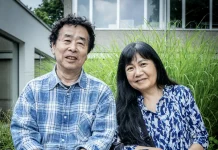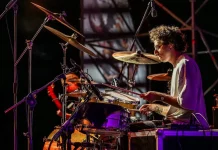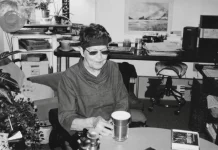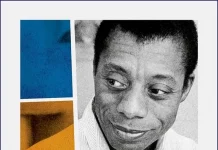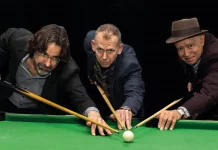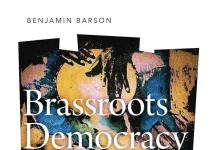Cassie Kinoshi is a saxophonist and writer of exceptional versatility. Not only does she lead the 10-piece jazz band SEED Ensemble, whose music includes African and Caribbean elements, and play in bands like Nérija and the Afrobeat-influenced Kokoroko but she has also composed for the National Theatre and had work performed by the London Symphony Orchestra. Perhaps it should be no surprise, then, that she has now written music for a dance company, BalletBoyz.
The company’s upcoming show, Deluxe, will be presented at Sadler’s Wells and elsewhere. It features Kinoshi’s music for Bradley 4:18, which was inspired by Kate Tempest’s poetry, in particular Pictures On A Screen. “I was familiar with their work, yeah,” says Kinoshi, using Tempest’s preferred pronoun. “And what resonated was the subject matter of being in a city and trying to understand your purpose in that environment and what your place in the world is.”
Of Frank Zappa: ‘I find him intriguing because he’s been influenced by so many different things and it all comes out in the music. He’s very meticulous about how he writes and notates but when you listen to it, it’s also got that improvised element. You can hear the jazz in his music’
Kinoshi worked closely with the choreographer Maxine Doyle. “Through the process we communicated a lot about how we wanted to interpret the poem for music and dance. It was very collaborative and I was very much in the space as things were being choreographed. And at some points I took my saxophone in and improvised and they would respond to that and vice versa.”
Kinoshi, who grew up in Welwyn Garden City, isn’t a complete newcomer to the world of dance. “BalletBoyz is ballet in a contemporary sense and that’s definitely something I’ve always been interested in and like watching especially since coming to London [as a student] and being exposed to more avenues of expression.”
Jazz musicians, of course, have a huge amount of freedom in expressing themselves. In writing for dance or indeed for theatre as she has previously done, does Kinoshi feel constrained by having to create something that meets the needs of others? “I wouldn’t say it’s frustrating,” she says. “It’s just a new set of boundaries and rules. In the context of the BalletBoyz the very collaborative process allowed me to interpret things very much through my own voice. That was one of the great things about working with Maxine.”
Some of Kinoshi’s versatility was developed at Trinity Laban Conservatoire of Music and Dance where she earned a BMus in Composition. “The course was very much rooted in classical composition and it delved a lot into visual arts and art performance and dance as well,” she explains.
While at Trinity, Kinoshi also studied with Tomorrow’s Warriors. “I had saxophone lessons with Jean Toussaint at Trinity but Tomorrow’s Warriors was a huge part of my jazz education and learning about playing in bands and getting my confidence up to a point that allowed me to improvise more honestly,” she says.
Kinoshi formed SEED Ensemble in 2016, the year after she graduated. On the band’s debut album, Driftglass, several of the tracks have a political or socio-cultural relevance. “A lot of issues that I address through music aren’t addressed in British education so I thought it was important for me to highlight things that are a part of our history as British people but also [relate] directly to my community as well,” she asserts.
One of the most powerful tracks is WAKE (For Grenfell), inspired by the 2017 tragedy in which 72 people living in the Grenfell Tower flats died when fire spread horrifically through the building. “It was such a moment in history,” sighs Kinoshi. “Not only was it devastating because of the loss of life but also because of how much it highlighted the socio-economic and classist systems that exist in the UK. I found it upsetting because I find a lot of situations, when it’s people from minority backgrounds, are rated as not as important. It affected me quite a lot.”
Driftglass was nominated for a Mercury Prize in 2019, alongside albums by the likes of Slowthai, Anna Calvi and the eventual winner Dave. “It was super exciting to have been nominated,” says Kinoshi. “Jazz is quite overlooked in the UK so it was nice to have that recognition in a more commercial space. But it’s like a token jazz album is nominated every year so I knew it probably wasn’t going to be Driftglass that won!”
The album, which includes tracks like Interplanetary Migration and Afronaut, has been labelled as Afrofuturism by some. “A lot of the subject matter does relate to Afrofuturism,” concedes Kinoshi. “But that wasn’t one of the key influences when I was writing it – it was more science fiction in general. But when you have science fiction and it’s got African or Caribbean themes it’s instantly thrown in with this Afrofuturism label.”
Kinoshi expresses a degree of ambivalence about her role as leader of SEED Ensemble, or “seed.”, as they now style themselves. “I enjoy it in the sense that I have all these brilliant musicians bringing my compositions to life and adding their amazing voices to it. But the admin side of being a leader is not enjoyable!”
She explains how she presents new compositions to the band. “I give them context and try and explain what it’s about and the feeling that it’s trying to evoke. And then I give them space to interpret that in their own way. Every musician in seed. was chosen because I like how they play. So I try not to put too many constraints on how they interpret the dots.”
Kokoroko and Nérija operate differently. “seed. is very much my project and I’ll bring my music to it and it’s very much about everyone bringing to life the message I’ve chosen to put out there. But in Kokoroko we all write the music and it’s collaborative and the process is much more equal. And Nérija is similar in that sense.”
One of Kinoshi’s most prestigious projects was composing the music for the National Theatre’s 2019 production of Caryl Churchill’s massively acclaimed play Top Girls. “That was great, because Lindsey Turner, the director, was very open-minded and it was my introduction into theatre that had a lot of resources to contribute to the music side of things,” she says. “It was a really great experience.”
Kinoshi has participated in the London Symphony Orchestra’s Panufnik Composers Scheme which led to a workshop performance of her composition If She Could Dance Naked Under Palm Trees. “The opportunity to write for one of the leading orchestras in the UK was invaluable,” she says. “I learnt a lot. And it was beneficial as well because of the other composers that I met on that scheme who introduced me to a whole new way of interpreting music and notation.”
An ambitious plan by seed. to present an evening of Frank Zappa’s music has been cancelled three times so far because of Covid-19 restrictions. “He’s an amazing composer,” enthuses Kinoshi. “As someone that’s also a composer-performer who is trying to draw from a lot of different avenues and put them in one space, I find him intriguing because he’s been influenced by so many different things and it all comes out in the music. He’s very meticulous about how he writes and notates but when you listen to it, it’s also got that improvised element. You can hear the jazz in his music.”
It’s often contended nowadays that jazz’s centre of gravity has moved from America to Europe and more interesting jazz is now being made in Europe – because, of course, of musicians like Kinoshi who blend jazz with African and Caribbean music and other elements. Kinoshi herself doesn’t buy the argument. “I wouldn’t agree with that statement at all. I think that jazz is black American music and it comes from that area of the world and they’ve always, since the 20s and 30s, been mixing it with African-Caribbean music. It always takes from the sound and the politics of the day so I wouldn’t say that European jazz is more interesting – it’s just different because it’s been influenced by different history and by different soundworlds.”
Kinoshi has in the past said that the life of a musician-composer is a lonely one which would probably surprise many who see musicians on stage basking in the glory of adoring crowds. “It can be lonely because you are in a room on your own for hours whether practising or writing. And touring, even in a band, you spend a lot of time on your own travelling and you’re not in your comfortable space. And then if you’re travelling like I have done as a composer you literally are in new cities or countries on your own for weeks or months at a time. So you spend quite a bit of time on your own and in your head when you’re in the creative process and then also when you’re travelling around to fulfil the performance side of it.”
Last year Kinoshi was awarded £25,000 by the Paul Hamlyn Foundation – an award that is made with no strings attached and with no requirement for the recipient to use the money for anything in particular. So, did she splash out on a fancy motor or a luxury holiday in the sun? “No, no, it’s gone towards setting up my own label [Beatprint Records] which has been really important in terms of gaining creative control,” she says. “And then also it went towards a new recording for seed.. All the music is written so we’re sorting out logistics before we can record that. So it went into supporting artistic things especially during the time where there wasn’t really much to be gained from live performance.”
BalletBoyz tour 8 March – 19 May. Information from balletboyz.com.
Cassie Kinoshi plays the Women of the World Festival at London Southbank Centre on 13 March.


